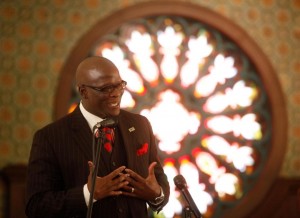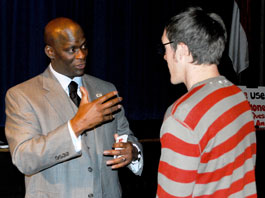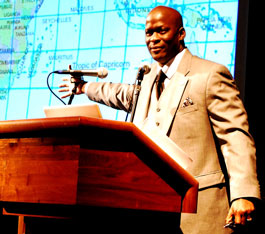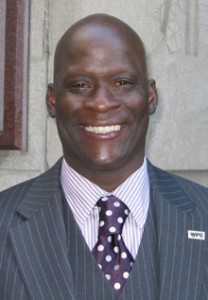By Jennifer Crain

Years ago, a man whom I’d never met described himself over the phone as “a white guy with a beard,” so I could pick him out of a crowd when we met to do some committee work.
I was surprised. And then surprised at myself for being surprised. When describing other people, or even themselves, I’d heard many others use skin color as a descriptor. I’d probably done it myself. But only, I realized, if their skin was a color other than white.
My reaction stemmed from what Dr. Eddie Moore, Jr. would call privilege. I didn’t expect another white person to have to identify himself as such because I was assuming, it’s painful to admit, that a person who wasn’t in front of me (on the phone, in an email) was white, unless they identified themselves otherwise.
For over 15 years Moore has been examining such cultural attitudes, exploring the dynamics of privilege and power and challenging audiences around the country to do the same.
Next Tuesday, the South Sound public will have a chance to participate when Moore launches South Puget Sound Community College’s Artist and Lecture Series. The year-long series, titled “Reflections,” begins with his September 17 lecture at 6:30 p.m. on the main stage of the Kenneth J. Minnaert Center for the Arts.
Titled “Trayvon Martin, Paula Deen, Riley Cooper and MOORE: A Courageous Conversation about the ‘N’ Word, White Supremacy, and Race in America,” the lecture is intended to initiate a conversation. Participants are invited to grapple with the nature and presence of privilege, in their own lives and in society, by exploring not only current events or racial slurs by celebrities but the presence of the “structural sources of oppression.”
 “I often feel like people are spending lots of time trying to understand racism and other kinds of ‘isms,’” Moore says, “but they’re not focusing on the kinds of systems and structures that created them. So they do good work in this area but it never gets at the source. It’s almost like taking cough syrup for your cough but you’re never looking at the reason why you have the cough.”
“I often feel like people are spending lots of time trying to understand racism and other kinds of ‘isms,’” Moore says, “but they’re not focusing on the kinds of systems and structures that created them. So they do good work in this area but it never gets at the source. It’s almost like taking cough syrup for your cough but you’re never looking at the reason why you have the cough.”
“Dr. Moore is well regarded in social justice circles,” says Kellie Purce Braseth, Dean of College Relations for SPSCC. “We’re fortunate and excited that he’s launching our series.”
She says the series begins on the heels of the 50th anniversary of the March on Washington and concludes near the 60th anniversary of Brown v. Board of Education, “bookended by events reflecting back on some really important times in terms of the journey for social justice and equity in our country.” Braseth says Moore, who is the Director of Diversity at Brooklyn Friends School in New York, is the ideal person to revive the series, which has been on hiatus for several years.
An insidious trait of privilege, says Moore, is its invisibility, something he admits he still encounters in himself. He was deeply affected two years ago, for example, when he heard the keynote address at the White Privilege Conference. The speech centered on the privilege of hearing, and Moore says it changed the way he thinks about his daily life.
 “There are a great number of us walking around every day [who are able to hear], and not giving it any thought,” Moore says. “Even though I’ve been doing this work for a number of years, it really just stopped me in my tracks.”
“There are a great number of us walking around every day [who are able to hear], and not giving it any thought,” Moore says. “Even though I’ve been doing this work for a number of years, it really just stopped me in my tracks.”
Because he believes privilege to be universal, Moore says his lectures and workshops approach the subject in a comprehensive manner, focusing on privilege that stems from race but also other sources, such as sexual identity and gender.
“I believe that racism is an extension of a system that creates the dynamic of privilege, white privilege being one of them,” he says. “But it’s not just white privilege that I’m talking about. I approach privilege comprehensively, in a way that’s not attacking, not degrading, not demeaning but just to say we’ve got to do some additional learning and growing around this topic.”
“The bottom line is: America is changing,” Moore goes on. “America is very, very different in the 21st century than it was the 20th century. We need to build skills and prepare for that kind of society by having diversity and cultural competency skills. But we can’t stop there. We also have to understand dynamics and issues of power and privilege so that we can be competent, confident and action-oriented leaders and 21st-century citizens.”
 “I’m really proud that SPSCC is creating the space,” Moore concludes. “It says a lot – being in a community that has created the space so we can have this kind of challenging conversation. The foundation of that [conversation] is going to be community. Because it’s not about attacking and degrading, it’s really about learning, leading and action.”
“I’m really proud that SPSCC is creating the space,” Moore concludes. “It says a lot – being in a community that has created the space so we can have this kind of challenging conversation. The foundation of that [conversation] is going to be community. Because it’s not about attacking and degrading, it’s really about learning, leading and action.”
The “Reflections” series will also feature Luis Urrea in a November 5 lecture. The poet Nikki Giovanni will speak on February 20 in celebration of Black History Month. The series will conclude with a commemoration of Brown v. Board of Education in late May. Other events will be announced as the year progresses.
Braseth recommends arriving early for Tuesday’s event to browse information from local organizations that will be tabling in the lobby.
All photos courtesy Dr. Eddie Moore, Jr.
South Puget Sound Community College Artist and Lecture Series
Dr. Eddie Moore, Jr.
“Trayvon Martin, Paula Deen, Riley Cooper and MOORE: A Courageous Conversation about the ‘N’ Word, White Supremacy, and Race in America”
Tuesday, September 17
6:30 p.m.
Kenneth J. Minnaert Center for the Arts
Free and open to the public




















































